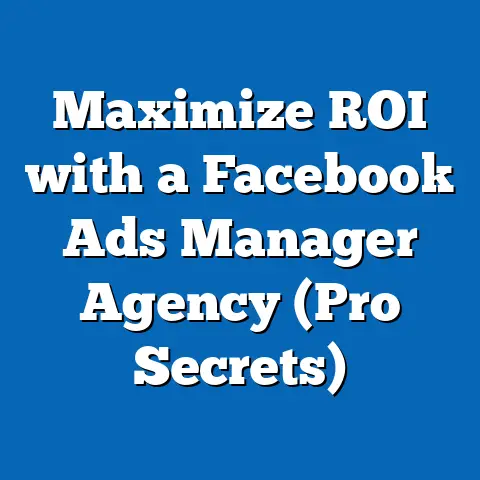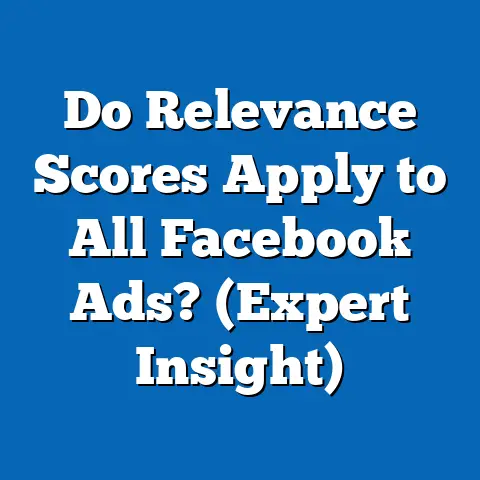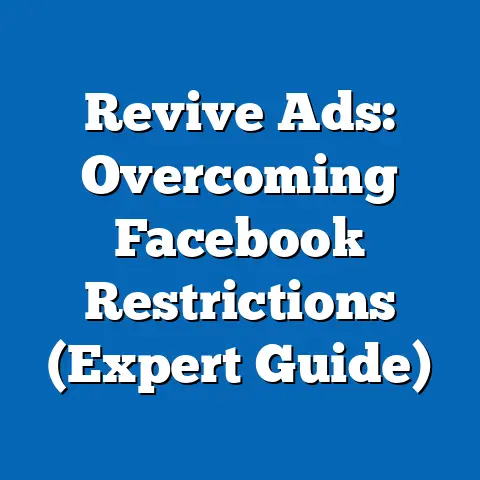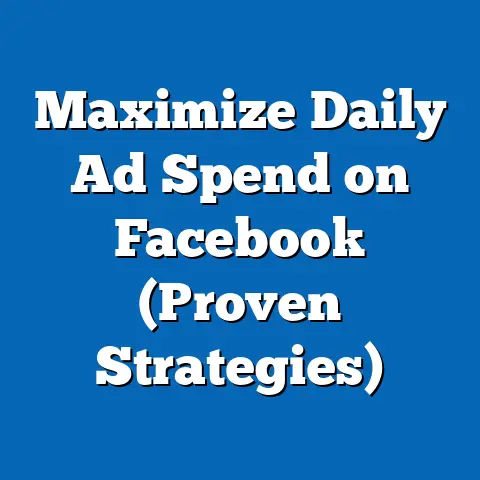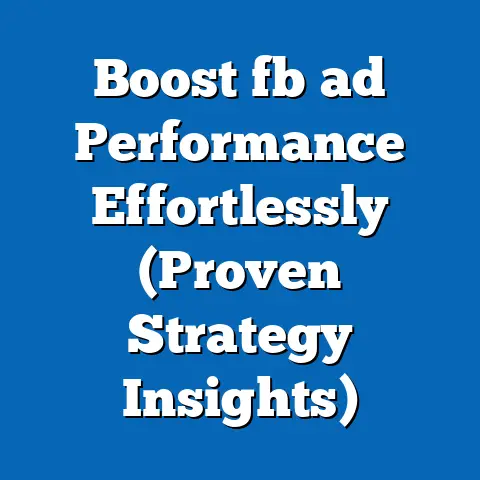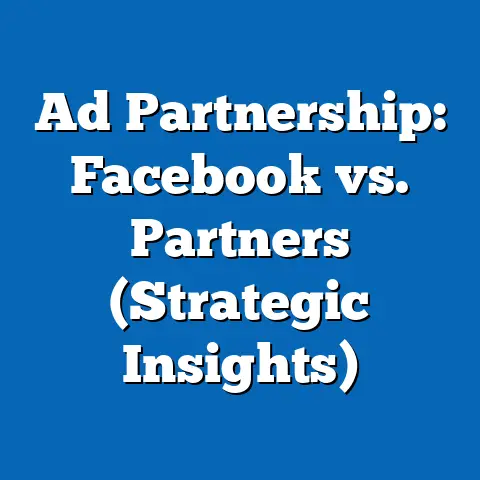Is Pausing Facebook Ads a Mistake? (Expert Insights)
Is Pausing Facebook Ads a Mistake? (Expert Insights)
We’ve all been there.
You’re staring at your Facebook Ads Manager, seeing costs rise, conversions dip, and the temptation to hit that pause button is overwhelming.
After all, isn’t it better to stop the bleeding and save some money?
The allure of short-term savings is powerful, especially when budgets are tight.
But here’s the thing: in the world of Facebook advertising, sometimes the quickest fix can lead to long-term pain.
Pausing your ads might seem like a smart move in the moment, but it could actually be detrimental to your brand visibility, audience engagement, and overall marketing strategy.
In this guide, I’m going to walk you through why pausing your Facebook ads might not be the best idea, and how to make sure your campaigns continue to deliver results.
Understanding the Facebook Ads Ecosystem
The Facebook ads platform isn’t just a simple billboard; it’s a complex ecosystem powered by algorithms that are constantly learning and adapting.
These algorithms analyze vast amounts of data to understand user behavior, predict ad performance, and optimize delivery.
When you launch a new ad campaign, the algorithm goes through a “learning phase,” experimenting with different audiences and placements to find the best fit.
Maintaining a consistent presence on Facebook and Instagram is crucial for several reasons.
First, it keeps your brand top-of-mind for potential customers.
Second, it allows the Facebook algorithm to gather data and optimize your campaigns effectively.
Every pause disrupts this process.
Think of it like learning to ride a bike.
You need to keep pedaling to maintain momentum and balance.
If you stop, you’re likely to fall.
Similarly, pausing your ads disrupts the momentum and forces the algorithm to essentially start over when you reactivate the campaign.
Ad Fatigue and Relevance Scores
One key concept to grasp is “ad fatigue.” This occurs when your audience sees your ads too frequently, leading to decreased engagement and higher costs.
Ironically, frequent pausing and restarting of ads can actually contribute to ad fatigue.
Here’s why: When you pause an ad, the algorithm stops learning.
When you restart it, the ad is essentially “new” again, and the algorithm needs to re-optimize.
This can lead to the ad being shown to the same people repeatedly as the algorithm tries to find its footing, causing them to become fatigued faster.
Furthermore, the relevance score, a metric that indicates how well your ad resonates with your target audience, can suffer.
When your ads are consistently performing well, your relevance score tends to be higher, leading to lower costs and better ad placement.
Pausing disrupts this positive feedback loop, potentially lowering your relevance score and increasing your ad costs in the long run.
Key Takeaway: The Facebook ads ecosystem thrives on consistency.
Pausing ads disrupts the learning process, potentially leading to ad fatigue, lower relevance scores, and higher costs.
Short-Term vs. Long-Term Strategy
The temptation to pause ads often stems from a short-term focus on cost-cutting.
You see a dip in performance, and the immediate reaction is to stop the bleeding.
However, successful Facebook advertising requires a long-term strategic vision.
It’s about building brand awareness, nurturing leads, and establishing a consistent presence in your target audience’s mind.
Think of it like investing in the stock market.
You wouldn’t pull out all your investments every time the market dips, right?
You’d likely ride out the fluctuations and stay invested for the long haul.
Facebook advertising requires a similar mindset.
I remember working with a client who was launching a new e-commerce store.
Initially, their sales were slow, and they wanted to pause their ads to save money.
I advised them against it, explaining that it takes time to build brand awareness and establish a consistent presence.
Instead, we focused on optimizing their targeting, refining their ad copy, and improving their landing page experience.
Within a few months, their sales started to climb steadily, and they were grateful they hadn’t given up prematurely.
Expert Insights on Pausing Ads
To further illustrate this point, let’s consider some expert insights.
Neil Patel, a renowned digital marketing expert, often emphasizes the importance of consistency in advertising.
He argues that pausing ads can lead to a loss of momentum and can make it harder to re-engage your audience in the future.
“Pausing your ads is like stopping a train,” Patel says.
“It takes a lot of energy to get it moving again.”
Similarly, Amy Porterfield, a social media marketing expert, highlights the importance of nurturing your audience over time.
She suggests that pausing ads can disrupt the customer journey and can lead to a loss of potential sales.
Case Studies and Statistics
Numerous case studies support the idea that maintaining a consistent ad presence is crucial for long-term success.
For example, a study by Facebook found that brands that maintained a consistent ad spend throughout the year saw a 20% higher return on ad spend (ROAS) compared to brands that paused their ads intermittently.
Another study by HubSpot found that companies that blog consistently see 13 times more leads than companies that don’t.
While this study focuses on blogging, the principle applies to Facebook advertising as well.
Consistent content and ad presence keep your brand top-of-mind and nurture leads over time.
Key Takeaway: While short-term cost savings may seem appealing, successful Facebook advertising requires a long-term strategic vision.
Maintaining a consistent ad presence is crucial for building brand awareness, nurturing leads, and achieving sustainable growth.
The Impact of Pausing Ads on Audience Targeting
One of the most significant impacts of pausing ads is the disruption it causes to your audience targeting and retargeting efforts.
Facebook’s algorithm relies on data to identify and target the most relevant audience for your ads.
When you pause your ads, you essentially stop feeding the algorithm with data, hindering its ability to optimize your targeting.
Think of it like training a dog.
You need to consistently reward good behavior to reinforce the desired actions.
If you stop training, the dog may forget what it has learned.
Similarly, pausing your ads stops the algorithm from learning and refining your audience targeting.
Lost Momentum in Building an Audience
Building an audience on Facebook takes time and effort.
You need to experiment with different targeting options, test various ad creatives, and analyze the results to identify what works best.
Pausing your ads disrupts this process and can lead to “lost momentum” in building your audience.
When you restart your ads, you essentially have to start the audience-building process all over again.
This can be frustrating and time-consuming, especially if you’ve already invested a significant amount of time and money into building your audience.
I once worked with a client who was targeting a very niche audience.
It took us several weeks to refine our targeting and identify the most responsive segments.
However, they paused their ads for a few weeks due to budget constraints.
When they restarted their ads, they were surprised to see that their performance had declined significantly.
It turned out that the algorithm had “forgotten” what it had learned, and we had to start the audience-building process all over again.
Maintaining a Consistent Message
Maintaining a consistent message and connection with potential customers is crucial for building brand loyalty and driving sales.
Pausing your ads disrupts this connection and can lead to a loss of trust with your audience.
Imagine you’re trying to build a relationship with someone.
You wouldn’t suddenly disappear for a few weeks and then expect to pick up right where you left off, would you?
The same principle applies to Facebook advertising.
You need to maintain a consistent presence and message to build trust and rapport with your audience.
Key Takeaway: Pausing ads disrupts audience targeting, leads to lost momentum in building an audience, and disrupts the connection with potential customers.
Maintaining a consistent message and presence is crucial for building brand loyalty and driving sales.
Financial Implications of Pausing Ads
While pausing ads may seem like a way to save money, it can actually lead to significant financial repercussions in the long run.
These repercussions can include the cost of re-engaging audiences, increased customer acquisition costs, and a lower overall return on ad spend.
The Cost of Re-Engaging Audiences
When you pause your ads, you risk losing touch with your audience.
They may forget about your brand, lose interest in your products or services, and move on to other options.
Re-engaging these lost customers can be costly and time-consuming.
You may need to run special promotions, offer discounts, or create new ad campaigns to recapture their attention.
These efforts can eat into your budget and reduce your overall return on ad spend.
I’ve seen this happen with several clients.
They pause their ads for a few weeks, and then they’re surprised to see that their re-engagement costs are much higher than their initial acquisition costs.
It’s often more expensive to win back a lost customer than it is to retain an existing one.
Underestimating Customer Acquisition Costs
Many businesses underestimate the cost of customer acquisition when they pause their ads.
They assume that they can simply restart their ads and pick up right where they left off.
However, as we’ve discussed, pausing ads disrupts the algorithm, hinders audience targeting, and can lead to a loss of momentum.
As a result, your customer acquisition costs may increase significantly when you restart your ads.
You may need to spend more money to reach the same number of potential customers, and your conversion rates may be lower.
Long-Term ROI of Maintaining Ad Spend
Financial experts often emphasize the importance of maintaining ad spend for long-term ROI.
They argue that consistent advertising builds brand awareness, drives customer loyalty, and ultimately leads to higher sales and profits.
Pausing your ads, on the other hand, can disrupt this positive feedback loop and can lead to lower long-term ROI.
While you may save some money in the short term, you risk sacrificing long-term growth and profitability.
Key Takeaway: Pausing ads can lead to significant financial repercussions, including the cost of re-engaging audiences, increased customer acquisition costs, and a lower overall return on ad spend.
Maintaining ad spend is crucial for long-term ROI.
Expert Recommendations and Best Practices
So, if pausing ads is generally a bad idea, what are the alternatives?
How can you manage your ad campaigns effectively without resorting to the pause button?
Here are some expert recommendations and best practices:
- A/B Testing: Continuously test different ad creatives, targeting options, and bidding strategies to optimize your campaigns.
A/B testing allows you to identify what works best and make data-driven decisions. - Audience Segmentation: Segment your audience based on demographics, interests, behaviors, and other factors.
This allows you to target your ads more effectively and deliver personalized messages. - Ad Creative Refreshes: Regularly update your ad creatives to prevent ad fatigue.
Use fresh images, compelling headlines, and engaging ad copy to keep your audience interested. - Budget Optimization: Adjust your budget based on performance.
If an ad is performing well, increase its budget.
If an ad is underperforming, decrease its budget or try a different approach. - Campaign Objectives: Ensure your campaign objectives are aligned with your business goals.
Are you trying to drive traffic, generate leads, or increase sales?
Choose the appropriate campaign objective and optimize your ads accordingly. - Leverage Automation: Utilize Facebook’s automated features, such as Campaign Budget Optimization (CBO) and automated bidding, to streamline your ad management and optimize performance.
These tools can help you allocate your budget more efficiently and achieve better results.
I’ve found that implementing these strategies can significantly improve ad performance and reduce the need to pause campaigns.
By focusing on continuous optimization and data-driven decision-making, you can achieve sustainable growth and avoid the pitfalls of pausing ads.
Key Takeaway: Instead of pausing ads, focus on continuous optimization through A/B testing, audience segmentation, ad creative refreshes, and budget optimization.
These strategies can help you improve ad performance and achieve sustainable growth.
Conclusion
In conclusion, while the temptation to pause Facebook ads may be strong during low-performing periods, it’s important to consider the potential long-term consequences.
Pausing ads can disrupt the algorithm, hinder audience targeting, increase customer acquisition costs, and ultimately lead to a lower return on ad spend.
Instead of pausing ads, focus on continuous optimization through A/B testing, audience segmentation, ad creative refreshes, and budget optimization.
By implementing these strategies, you can improve ad performance, achieve sustainable growth, and avoid the pitfalls of pausing ads.
Remember, Facebook advertising is a long-term game.
It requires patience, persistence, and a strategic mindset.
By maintaining a consistent ad presence, nurturing your audience, and continuously optimizing your campaigns, you can achieve long-term success and drive significant results for your business.
Now, take a look at your current advertising practices and consider maintaining a consistent ad presence as a key to long-term success.
You will thank me later.

